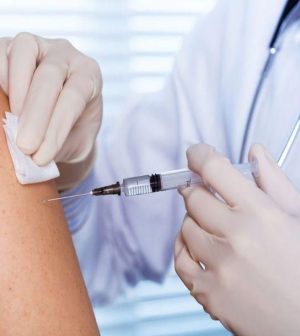- 7 Best Breads for Maintaining Stable Blood Sugar
- Gelatin vs. Collagen: Which is Best for Skin, Nails, and Joints?
- The Long-Term Effects of Daily Turmeric Supplements on Liver Health
- Could Your Grocery Store Meat Be Causing Recurring UTIs?
- Are You Making This Expensive Thermostat Error This Winter?
- Recognizing the Signs of Hypothyroidism
- 10 Strategies to Overcome Insomnia
- Could Artificial Sweeteners Be Aging the Brain Faster?
- Techniques for Soothing Your Nervous System
- Does the Water in Your House Smell Funny? Here’s Why
COVID Vaccines Offer Only Some Protection for People Battling Myeloma

COVID-19 vaccination provides far less protection to people with multiple myeloma than to survivors of other types of cancer, new research shows.
The findings highlight the need for multiple myeloma patients “to be especially careful — to take social distancing seriously and utilize masking — even if they’ve been vaccinated,” said study senior author Dr. Nikhil Munshi, from the Jerome Lipper Multiple Myeloma Center at Dana-Farber Cancer Institute in Boston.
The new findings come from a follow-up to research recently published in JAMA Oncology, where COVID infection rates were assessed in nearly 60,000 vaccinated and unvaccinated cancer survivors who had not received a systemic cancer treatment such as chemotherapy or immunotherapy in the previous six months.
The new study compared 818 adults with multiple myeloma who had been vaccinated against COVID-19 with an equal number of unvaccinated patients who also had the blood cancer.
Also included were nearly 9,600 patients with a condition known as monoclonal gammopathy of undetermined significance (MGUS), which increases myeloma risk. Half were vaccinated, half unvaccinated.
Over two to 41 weeks of follow-up, the effectiveness of vaccination in preventing infection varied widely. After two doses, it was 5.6% in myeloma patients, and 27.2% in people with MGUS. This compares with 85% in cancer survivors not on treatment.
Vaccine effectiveness started to decline about six months after patients’ second dose, the study found.
The myeloma patient findings were presented Sunday at a meeting of the American Society of Hematology in Atlanta. Research presented at meetings should be considered preliminary until published in a peer-reviewed journal.
Researchers said the lower effectiveness of vaccination in myeloma patients likely owes to both the disease itself and to its treatment. Both can weaken the immune system.
“We found that, compared to patients who hadn’t been treated in the last six months, the rate of breakthrough infections was 2.6%,” Munshi said in a Dana-Farber news release.
“For patients who were treated within the last 90 days, that number goes up to 4-5%,” he added. “And in patients treated with daratumumab [an immunotherapy agent], the number was 9%.”
More information
The American Cancer Society has more on multiple myeloma.
SOURCE: Dana-Farber Cancer Institute, news release, Dec. 11, 2021
Source: HealthDay
Copyright © 2026 HealthDay. All rights reserved.










